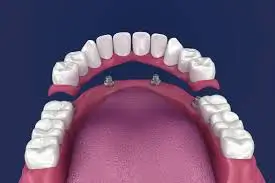Implant-Supported Dentures: Stability, Function, and Confidence Restored
For many patients struggling with ill-fitting traditional dentures, the dream of speaking, chewing, and smiling confidently again may seem out of reach. Fortunately, implant-supported dentures offer a revolutionary solution that combines the stability of dental implants with the affordability of full or partial dentures.
At F Dental Center, implant-supported dentures are a core part of our advanced prosthodontic services, delivering life-changing results for patients suffering from severe tooth loss or jawbone deterioration.
This article explores how implant-supported dentures work, their benefits, the procedure involved, and why they are an ideal solution for those seeking a secure, long-lasting alternative to traditional dentures.

Understanding Implant-Supported Dentures
Implant-supported dentures are overdentures that are anchored to the jawbone via titanium dental implants. Unlike traditional dentures, which rest on the gums and may require adhesives, implant-supported options snap securely into place, significantly improving retention and stability.
They are used when a patient is missing most or all of their teeth but still has enough jawbone to support implants.
Two Main Types
- Bar-Retained Dentures: A thin metal bar is attached to implants and the denture clips onto it.
- Ball-Retained (Locator-Attached) Dentures: Each implant has a ball-shaped abutment that fits into sockets on the denture.
Both types offer improved function over conventional dentures, but the ideal choice depends on bone quality, patient preference, and clinical goals.
Ideal Candidates for Implant-Supported Dentures
Implant-supported dentures are suitable for patients who:
- Are missing all teeth in the upper or lower jaw
- Are dissatisfied with the fit of conventional dentures
- Have sufficient bone volume or can undergo bone grafting
- Want a more secure, natural-feeling solution
- Desire better chewing power and speech clarity
- Seek a fixed or semi-fixed denture option
They are especially beneficial for patients suffering from denture-related pressure sores, speech difficulty, or inability to enjoy a diverse diet.
The Advantages Over Traditional Dentures
The benefits of implant-supported dentures are extensive—both in terms of function and lifestyle enhancement.
Superior Stability
Implants anchor the denture firmly to the jaw, preventing it from slipping or moving during speaking or eating.
Improved Chewing Efficiency
Patients can enjoy harder or chewier foods, expanding their diet and improving nutritional health.
Bone Preservation
Implants stimulate the jawbone, preventing the bone loss typically caused by conventional dentures.
Better Aesthetics
The denture sits closer to the gums, mimicking the appearance of natural teeth more effectively.
Enhanced Speech
With improved stability, patients can speak clearly without fear of slurring or clicking sounds.
Long-Term Cost Efficiency
Although initially more expensive, implant-supported dentures require fewer adjustments and replacements over time.
Increased Comfort
They eliminate the need for denture adhesives and reduce gum irritation.
The Implant-Supported Denture Procedure
The journey to a new smile begins with a personalized consultation, where your prosthodontist will assess your oral condition and design a treatment plan. The process includes several stages:
Step 1: Initial Assessment and Imaging
- Oral examination
- Digital X-rays or CBCT scans to assess bone volume
- Impressions of the gums and any remaining teeth
- Smile design planning
Step 2: Implant Placement Surgery
- Performed under local anesthesia or sedation
- Implants (usually 2–6 per jaw) are placed into the jawbone
- Healing period of 3–6 months to allow osseointegration
Step 3: Abutment Attachment
- Small metal connectors (abutments) are attached to implants
- A healing collar may be placed to shape the gums
Step 4: Denture Fabrication and Fitting
- Custom denture is fabricated to fit the abutments precisely
- Denture is securely attached to the implants via snap-on mechanism or bar
- Final adjustments are made for comfort, fit, and function
In some cases, immediate-load dentures can be placed on the same day as implant surgery, reducing overall treatment time.
Materials Used in Implant-Supported Dentures
These dentures can be made from various high-quality materials:
Acrylic Resin
Commonly used for the denture base and artificial teeth. Affordable and esthetic.
Porcelain or Zirconia
Used for higher-end teeth to mimic natural enamel with exceptional durability.
Titanium or Cobalt-Chromium
Used in the bar structure or implant components due to strength and biocompatibility.
Your prosthodontist will recommend materials based on your functional needs, aesthetic goals, and budget.
Upper vs. Lower Jaw: Different Needs
Patients often require different strategies for the upper and lower jaws.
Lower Jaw
More common for implant-supported dentures due to the instability of lower conventional dentures. Requires fewer implants (as few as 2).
Upper Jaw
May require 4–6 implants due to softer bone density. Palate can often be left open for better taste and comfort.
Maintenance and Care
While more stable and functional, implant-supported dentures still require daily maintenance:
- Remove the dentures daily for cleaning (if removable type)
- Brush the gum tissue, tongue, and palate with a soft toothbrush
- Clean around implants and under the denture attachments
- Use non-abrasive denture cleaners
- Visit your dentist regularly for check-ups and professional cleanings
Proper maintenance ensures the longevity of both implants and dentures.
Common Challenges and How to Overcome Them
Like any dental procedure, implant-supported dentures come with possible challenges:
Healing Time
Bone healing after implant placement can take several months. Temporary dentures may be provided during this period.
Soreness or Pressure Points
Initial discomfort is normal, but adjustments will be made to eliminate sore spots.
Implant Failure
Rare, especially when performed by experienced specialists. Proper hygiene and avoiding smoking are critical to success.
Cost Considerations
They are more costly upfront, but financing options and long-term benefits make them a worthy investment.
How Implant-Supported Dentures Improve Quality of Life
Patients who switch from traditional to implant-supported dentures report a significant improvement in various aspects of life:
- Ability to chew a wider range of foods
- Enhanced self-confidence in social settings
- Better facial support and reduced sunken appearance
- Freedom from adhesives and daily denture insecurity
- A more youthful smile
The emotional and psychological relief of having a secure, natural-looking smile cannot be overstated.
Why Choose F Dental Center for Implant-Supported Dentures
At F Dental Center, we combine advanced prosthodontic expertise with the latest implant technologies to deliver reliable, customized solutions. Here’s what sets us apart:
- Experienced prosthodontists and oral surgeons
- On-site advanced imaging and lab support
- Personalized treatment plans and digital smile design
- Focus on patient comfort, function, and aesthetics
- Post-procedure care and support for lasting results
Whether you’ve worn dentures for years or are new to tooth replacement, our team is committed to helping you achieve the confident smile you deserve.
Conclusion
Implant-supported dentures represent a breakthrough in modern dentistry, offering a stable, functional, and beautiful alternative to traditional dentures. They provide life-changing results for individuals struggling with loose, uncomfortable dentures or multiple missing teeth.
With careful planning, expert care, and state-of-the-art technology, these restorations can restore more than just your smile—they can give you back your freedom and confidence.
If you’re ready to explore implant-supported dentures, F Dental Center invites you to schedule a consultation with our prosthodontic team. Let us help you rediscover comfort, stability, and joy in your daily life.
